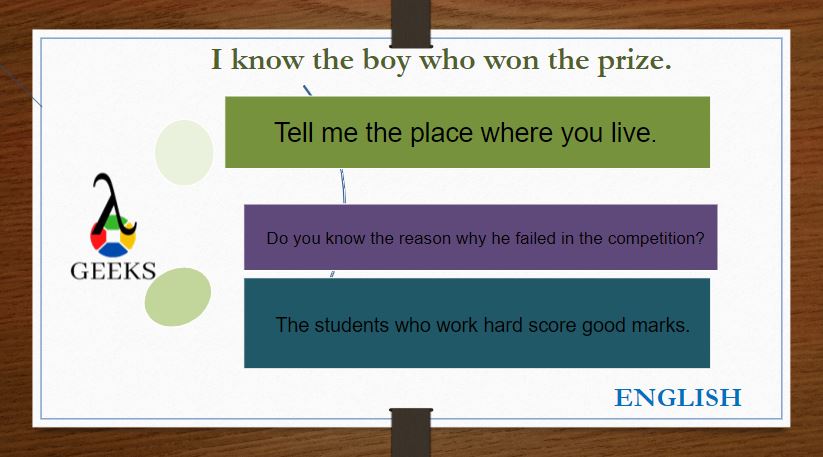An adjective clause is a sub-ordinate clause. It is placed after the noun that it modifies. In an adjective clause we come to know the answers of the questions ‘which one’ or ‘what kind’. Its function is like an adjective. It needs a main clause to express its meaning. We cannot call it independent clause for it stands on the main clause.
For examples;
- 1.I know the boy who won the prize.
- 2.Tell me the place where you live.
- 3.Do you know the reason why he failed in the competition?
- 4.This is the school where I completed my school final.
- 5.The boy told me the fact that he passed with credit.
- 6.The gallery which holds only 5000 people was crowded.
- 7.The book which I bought yesterday has been stolen.
- 8.Yesterday Samir went to the park where he saw a huge crowd of people.
- 9.The doctors are trying to cure the man who has high fever.
- 10.The boy whose names are on the list will get the chance to go to the trip.
- 11.Pizzawhich most people like is not very good for health.
- 12.The students who work hard score good marks.
- 13.My grandmother remembers the days when there were no televisions.
- 14.The woman loved the little boy who was not seen again.
- 15.Do you know the way how he did it?
- 16.The forest through which the two friends travelled was dark and gloomy.
- 17.The teacher who teaches us is respected by all the students.
- 18.Coal which is found in West Bengal is a very useful metal.
- 19.The house where we live is in ruins now.
- 20.The boy who won the first prize is my brother.
- 21.Rathin Bose has a brilliant son who is certain to bring credit to his family.
- 22. My sister who lives in Kolkata is a nurse.
Adjective clause examples with detailed explanations
1.I know the boy who won the prize.
In this example the dependent clause ‘who won the prize’ is an adjective clause. It modifies the noun the ‘boy’. It depends on the main clause ‘I know the boy’ to express its meaning.
2.Tell me the place where you live.
This example shows that the part of the sentence ‘where you live’ is a dependent clause. It depends on the main clause ‘tell me the place’ to express its meaning. It modifies the noun ‘place’. It is also called an antecedent.
3.Do you know the reason why he failed in the competition?
In this above example ‘why he failed in the competition ‘in a dependent clause. It modifies the noun ‘reason’ and acts as an adjective. It completely depends on the main clause ‘do you know the reason’ to express its meaning.
4.This is the school where I completed my school final.
The part of the sentence ‘where I completed my school final’ is a dependent adjective clause because it depends on ‘this is the school’ to express its meaning. It modifies the noun ‘school’ and acts as an adjective.
5.The boy told me the fact that he passed with credit.
Here ‘that he passed with credit’ is a dependent adjective clause. It modifies the noun ‘fact’.
6.The gallery which holds only 5000 people was crowded.
In this sentence ‘which holds 5000 people’ is a dependent adjective clause. It modifies the noun ‘gallery’.
7.The book which I bought yesterday has been stolen.
Here ‘which I bought yesterday’ is a dependent adjective clause .It modifies the antecedent ‘book’.
8.Yesterday Samir went to the park where he saw a huge crowd of people.
Here ‘where he saw a huge crowd of people’ is a dependent adjective clause. It modifies the noun ‘park;
9.The doctors are trying to cure the man who has high fever.
Here ‘who has high fever’ is an adjective dependent clause. It modifies the noun ‘man’.
10.The boys whose names are on the list will get the chance to go to the trip.
Here ‘whose names are on the list; is an adjective dependent clause. It modifies the antecedent ‘boys;.
11.Pizza which most people like is not very good for health.
Here ‘which most people like’ is an adjective dependent clause. It acts as an adjective and modifies the noun ‘pizza’.
12.The students who work hard score good marks.
Here ‘who work hard ‘ is an adjective dependent clause. It modifies the noun ‘students’.
13.My grandfather remembers the days when there were no televisions.
In this example ‘when there were n televisions; is a dependent clause. It modifies the noun ‘days’.
14.The woman loved the little boy who was not seen again.
In this example ‘who was not seen again’ is an adjective dependent clause. It modifies the noun ‘boy’.
15.Do you know the way how he did it?
Here ‘how he did it’ is an adjective dependent clause. It modifies the noun ‘way’.
16.The forest through which the two friends travelled was dark and gloomy.
Here ‘which the two friends travelled’ is an adjective dependent clause. It modifies the noun ‘forest’.
17.The teacher who teaches us is respected by all the students.
Here the part ‘who teaches us’ is an adjective dependent clause. It modifies the antecedent ‘teacher’.
18.Coal which is found in West Bengal is a very useful metal.
Here ‘which is found in West Bengal’ is a dependent clause, It modifies the noun ‘coal’.
19.The house where we live is in ruins now.
Here ‘where we live’ is an adjective dependent clause. It modifies the noun ‘house’.
20.The boy who won the first prize is my brother.
In this example ‘who won the first prize’ is an adjective dependent clause. It modifies the noun ‘boy’.
21.Rathin Bose has a brilliant son who is certain to bring credit to his family.
Here ‘who is certain to bring credit to his family’ is an adjective clause. It modifies the noun ‘son’.
22. My sister who lives in Kolkata is a nurse.
Here ‘who lives in Kolkata’ is an adjective clause. It modifies the noun ‘sister’.
We must know the facts related to adjective or relative clause. Now we will get to know how to find them.
In a sentence adjective clause has the following components.
1. There are a subject and a verb in an adjective clause. But it cannot be called a meaningful sentence because it depends on main clause.
2. An adjective clause generally begins with a relative pronoun but it can sometimes be omitted. In the sentence the relationship between the clause and the antecedent is formed by the relative pronouns.
3.The adjective clause is placed after the noun and this noun is known as an antecedent.
4.We get to know additional information about the noun that it modifies from the adjective clause.
Conclusion
In this article we get to know fair knowledge on adjective clause. This understanding will help us to form adjective clause in a better way.

Hi…. I am Goutam Datta. I have completed a double M. A. in English and B. Ed. I am a creative writer. Currently, I am a part of the LambdaGeeks.
